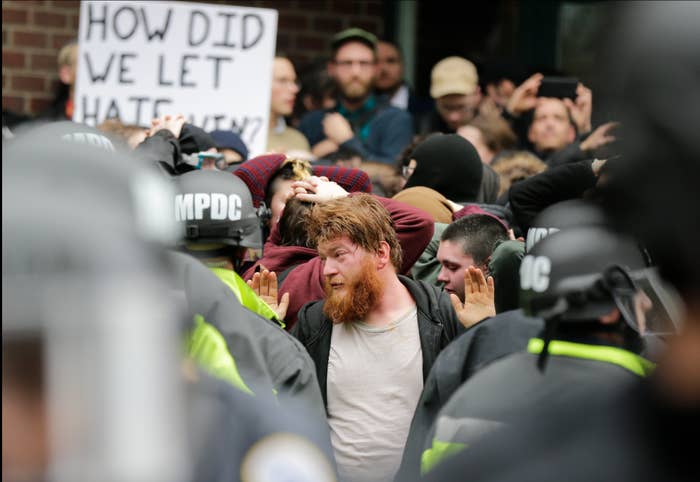
Federal prosecutors on Wednesday dropped seven cases against people charged with rioting in Washington, DC, during President Donald Trump's inauguration, after getting in trouble in court for how they handled evidence provided by the right-wing activist group Project Veritas.
The announcement came after a judge concluded last week that the government wrongly withheld the full version of a video of a pre-protest planning meeting secretly recorded by a Project Veritas operative. The revelation of that video led to the discovery of other undisclosed Project Veritas videos, prompting defense lawyers to protest and a judge to find that prosecutors committed a "serious violation."
It's the latest setback for the US Attorney's Office in Washington in the year and a half since police arrested more than 200 people during anti-Trump demonstrations in Washington on Jan. 20, 2017. A jury acquitted the first group to stand trial late last year, and prosecutors then dismissed charges against the majority of defendants, saying they wanted to focus their efforts on the most serious offenders.
There are now 52 defendants facing charges. The second trial has been proceeding in recent weeks before a different Superior Court judge; closing arguments were Wednesday.
Wednesday's hearing got even worse for the government after prosecutors announced they would drop the seven cases and dismiss several charges against three other remaining defendants. District of Columbia Superior Court Chief Judge Robert Morin said prosecutors erred by failing to disclose the existence of the additional Project Veritas videos to the defense and to the judge.
Morin questioned whether the lead prosecutor, Assistant US Attorney Jennifer Kerkhoff, gave him false information, noting that she told him at an earlier hearing that there was one video. Kerkhoff was not in the courtroom — she was elsewhere in the courthouse for the trial of another set of Jan. 20 defendants — and the prosecutor who was before Morin, Assistant US Attorney Ahmed Baset, said he couldn't speak to what Kerkhoff had said before.
Morin granted the government's request to dismiss most of the charges they asked to drop against the seven defendants without prejudice, meaning the government could, at least in theory, bring them again in the future; Baset said they did not plan to do so. But as a sanction for the evidence-related violations, Morin dismissed a conspiracy charge with prejudice for the seven defendants, meaning prosecutors couldn't try again later, as well as for three defendants whose cases are still pending.
Morin also said that in the next trial, the government couldn't rely on a legal theory it had planned to use, known as the Pinkerton theory, to argue that multiple people accused of being part of a conspiracy were criminally responsible for crimes committed as part of that conspiracy. The government could still argue that defendants aided or abetted crimes, the judge said.
It wasn't immediately clear what effect Morin's ruling would have on the rest of the remaining cases. Baset told the judge Wednesday that prosecutors did not plan to use any Project Veritas videos in any cases going forward. He said the government did not have reason to doubt the authenticity of the videos, but said they had become a "distraction."
"The government's focus in this case has always been about conduct," he said. Dismissing the cases in which the videos had become an issue was an attempt to "refocus," he said.
Baset told the judge that they hadn't disclosed the other Project Veritas videos because the contents concerned inauguration protest planning that wasn't related to the demonstration that ended in mass arrests.
A spokesperson for the US Attorney's Office did not immediately return a request for comment.
Project Veritas, an investigative reporting nonprofit led by the conservative activist James O'Keefe III, infiltrated and secretly recorded videos of a Jan. 8, 2017, inauguration protest planning meeting. A portion of one video — in which one of the operatives was recorded saying, "I was talking with one of the organizers from the IWW and I don't think they know anything about any of the upper echelon stuff" — wasn't included in the clipped version provided to the defense.
Defense lawyers argued this part of the video undercut the government's theory that defendants who attended the meeting were involved in planning violent activity.
Andrew Clarke, one of the defense lawyers, told reporters after the hearing that the latest dismissals showed that "the First Amendment is still alive."
"These defendants were being charged for organizing protests ... The government overstepped its boundaries," Clarke said.
Clarke's client Dylan Petrohilos, whose case was dismissed Wednesday, praised the defendants' "collective" organizing. Many defendants pledged not to cooperate with the government or take action in their cases that could harm a codefendant's case.
"There are still 52 defendants left that are on trial because [the Metropolitan Police Department] decided to not follow its own rules that day, to make a mass arrest without warning, and are still people that should not be facing any legal consequences," Petrohilos said.
Breaking: my case was just dismissed

